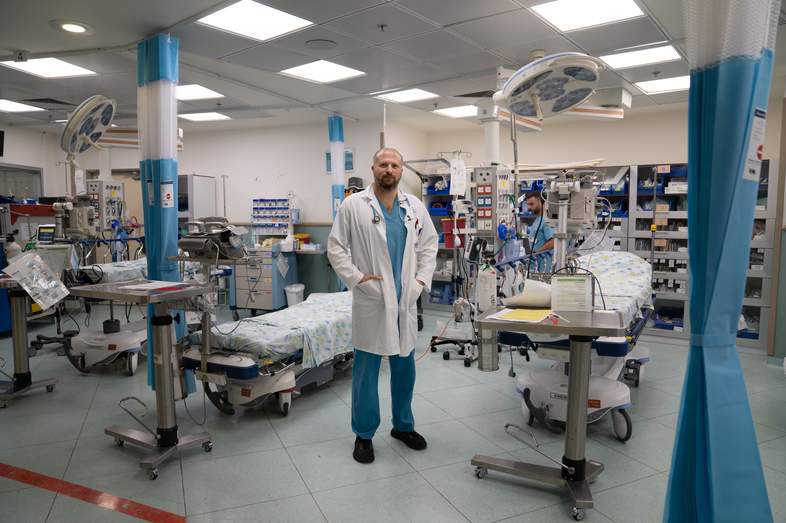Israeli Hospitals Go Underground To Operate During Lebanese Rocket Attacks
Israeli hospitals go underground to operate during Lebanese rocket attacks. As fighting between Israel and Lebanese extremists heats up, the Galilee Medical Center in northern Israel is making plans to keep treating patients despite the danger.
Author:Hajra ShannonReviewer:Paula M. GrahamNov 09, 202338 Shares9.4K Views

Israeli hospitals go underground to operate during Lebanese rocket attacks. As fighting between Israel and Lebanese extremists heats up, the Galilee Medical Center in northern Israel is making plans to keep treating patients despite the danger.
“„We are underground with the patients because we are preparing ourselves to continue taking care of our patients, even under fire.- Dr. Masad Barhoum, the director of the hospital
On October 7, when Hamas-backed terrorists infiltrated from the Gaza Strip into southern Israel, murdering over 1,400 people and seizing over 240 prisoners, the hospital transferred its first patients underground.
Since then, Israel has attacked Gaza, governed by Hamas, killing over 10,000 Palestinians and crippling overloaded hospitals. The battle has also sparked a "limited spillover" of conflict between Israeli soldiers and terrorists in nearby Lebanon.
Every day, rockets and artillery from Iran-backed Hezbollah and other armed organizations in Lebanon rain down on northern Israel, and scores of airstrikes have resulted in the deaths of civilians on both sides of the border.
In Israel's 2006 conflict with Lebanon, a rocket from Lebanon struck the hospital's fourth floor, but the personnel had already relocated medical treatment underground, thanks to Galilee's wartime defenses.
Hospital Beds Replace Parking Spots In Underground Garage
Rambam Health Care Campus, Israel's biggest trauma hospital, converted a three-story subterranean parking lot into an underground hospital. Beds, oxygen supplies, monitors, and a respirator have been added to the space.
There are 1,400 beds available underground at this facility. Dr. Netanel Horowitz is concerned that increased border action may force them to go underground as they work to put up the garage-turned-hospital in Haifa.
In response to Israel's attack in Gaza and its actions towards Lebanon, Hezbollah leader Hassan Nasrallah has declared his organization's willingness to intensify the fight.
Israeli Prime Minister Benjamin Netanyahu has also made it clear that Hezbollah would pay a heavy price for attacking Israel from Lebanon.
Model Hospital Away From The Border
Rambam Health Care Campus, Israel's biggest trauma hospital, converted a three-story subterranean parking lot into an underground hospital. Beds, oxygen supplies, monitors, and a respirator have been added to the space.
There are 1,400 beds available underground at this facility. Dr. Netanel Horowitz is concerned that increased border action may force them to go underground as they work to put up the garage-turned-hospital in Haifa.
In response to Israel's attack in Gaza and its actions towards Lebanon, Hezbollah leader Hassan Nasrallah has declared his organization's willingness to intensify the fight.
Israeli Prime Minister Benjamin Netanyahu has also made it clear that Hezbollah would pay a heavy price for attacking Israel from Lebanon.
“„We have drills to receive such trauma cases, but no one prepared me for receiving family member. I went from being a doctor to being a family member and it was a bit confusing. It took me several moments to cool down my nerves and start after receiving them.- Dr. Bahir Sirhan, Galilee hospital's emergency department
Staff Prepared For Underground Migration
The Rambam Hospital in Haifa, Israel, is housed under a three-story underground parking garage that was once used for storing cars.
The subterranean facilities, which were previously employed during the COVID-19 epidemic, have been undergoing a drill to enable nurses and physicians become acclimated to working in the location.
Triage and care of simulated patients, portrayed by colleagues and Israeli military personnel, is part of the exercise. Staff members will need to practice wheeling beds in the correct direction because of the noise levels and the relocation of hospital wings.
Nurses, however, are always sure that they will find something out eventually. The hospital's pediatric dialysis unit is now housed in the garage, where it has been fully operational for some time.
Final Words
All around Israel, but notably in the north, hospitals have moved underground or are making preparations to do so.

Hajra Shannon
Author

Paula M. Graham
Reviewer
Latest Articles
Popular Articles
